Monthly Updates on Recent Books in the History of Christianity
To raise awareness of recent books in the history of Christianity, the editorial staff of Church History: Studies in Christianity and Culture highlights each month a list of 10-15 books in diverse periods and geographical regions that we hope will be of interest to our members. We include here below the seventeenth monthly list, chosen by our staff, with excerpts from the publishers’ blurbs.
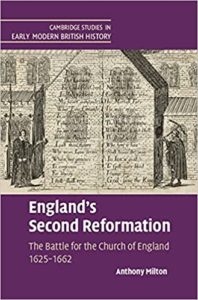
Anthony Milton, England’s Second Reformation: The Battle for the Church of England 1625–1662. 2021
England's Second Reformation reassesses the religious upheavals of mid-seventeenth-century England, situating them within the broader history of the Church of England and its earlier Reformations. Rather than seeing the Civil War years as a destructive aberration, Anthony Milton demonstrates how they were integral to (and indeed the climax of) the Church of England's early history. All religious groups – parliamentarian and royalist alike – envisaged changes to the pre-war church, and all were forced to adapt their religious ideas and practices in response to the tumultuous events. Similarly, all saw themselves and their preferred reforms as standing in continuity with the Church's earlier history. By viewing this as a revolutionary 'second Reformation', which necessarily involved everyone and forced them to reconsider what the established church was and how its past should be understood, Milton presents a compelling case for rethinking England's religious history.
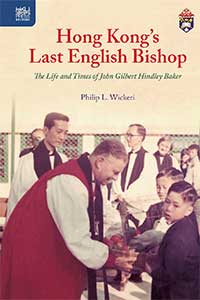
Philip L. Wickeri, Hong Kong’s Last English Bishop: The Life and Times of John Gilbert Hindley Baker. 2021
In Hong Kong’s Last English Bishop, Philip L. Wickeri explores the life and times of John Gilbert Hindley Baker, who served as Bishop of the Anglican Diocese of Hong Kong and Macau from 1966 to 1981. Before being elected bishop, Baker served as a missionary in wartime and revolutionary China, as a priest in America during the early years of the Cold War, and as a mission leader in the Church of England when churches in many parts of the world were becoming independent. He was a faithful correspondent and a prolific writer throughout his life, offering a personal commentary on the churches and the societies in which he lived. Wickeri has made extensive use of Baker’s writings and other archival materials to provide a vivid picture of his life and work. Bishop Baker was instrumental in working for reconciliation after the 1967 riots, expanding the work of the diocese, and engaging Hong Kong with the wider world. In 1971, he opened a new era in the Anglican Communion by legally ordaining the first women priests. This book is indispensable for understanding the development of the Hong Kong Anglican Church.
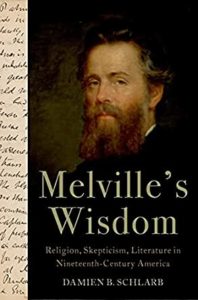
Damien B. Schlarb, Melville's Wisdom: Religion, Skepticism, and Literature in Nineteenth-Century America. 2021
This book explores the manner in which Herman Melville responds to the spiritual crisis of modernity by using the language of the biblical Old Testament wisdom books to moderate contemporary discourses on religion, skepticism, and literature. Melville’s work is an example of how romantic literature fills the interpretive lacuna left by contemporary theology. This book argues that attending to Melville’s engagement with the wisdom books (Job, Proverbs, and Ecclesiastes) can help us understand a paradox at the heart of American modernity: the simultaneous displacement and affirmation of biblical language and religious culture.
In wisdom, which addresses questions of theology, radical skepticism, and the nature of evil, Melville finds an ethos of critical inquiry that allows him to embrace the acumen of modern analytical techniques such as higher biblical criticism, while salvaging simultaneously the spiritual authority of biblical language. Wisdom for Melville constitutes both object and analytical framework in this balancing act. Melville’s Wisdom joins other works of postsecular literary studies in challenging its own discipline’s constitutive secularization narrative by rethinking modern, putatively secular cultural formations in terms of their reciprocity with religious concepts and texts. The book foregrounds Melville’s sustained, career-spanning concern with biblical wisdom, its formal properties, and its knowledge-creating potential. By excavating this project from Melville’s oeuvre, Melville’s Wisdom shows how he seeks to avoid the spiritually corrosive effects of suspicious reading while celebrating truth-seeking over subversive iniquity.
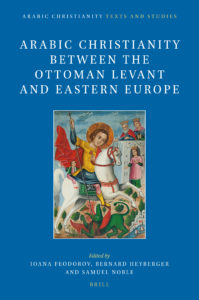
Ioana Feodorov, Bernard Heyberger, and Samuel Noble, eds. Arabic Christianity Between the Ottoman Levant and Eastern Europe. 2021
This volume sheds light on the historical background and political circumstances that encouraged the dialogue between Eastern-European Christians and Arabic-speaking Christians of the Middle East in Ottoman times, as well as the means employed in pursuing this dialogue for several centuries. The ties that connected Eastern European Christianity with Arabic-speaking Christians in the 16th-19th centuries are the focus of this book. Contributors address the Arabic-speaking hierarchs’ and scholars’ connections with patriarchs and rulers of Constantinople, the Romanian Principalities, Kyiv, and the Tsardom of Moscow, the circulation of literature, models, iconography, and knowhow between the Middle East and Eastern Europe, and research dedicated to them by Eastern European scholars.
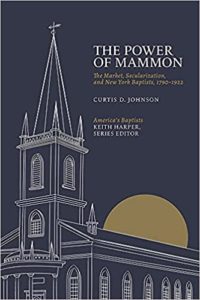
Curtis D. Johnson, The Power of Mammon: The Market, Secularization, and New York Baptists, 1790-1922. 2021
In The Power of Mammon, Curtis D. Johnson describes how the market economy and market-related forces, such as the media, politics, individualism, and consumerism, radically changed the nature of Baptist congregational life in New York State during three centuries. Collectively, these forces emphasized the importance of material wealth over everything else, and these values penetrated the thinking of Baptist ministers and laypeople alike. Beginning in the 1820s, the pastorate turned into a profession, the laity’s influence diminished, closeknit religious fellowships evolved into voluntary associations, and evangelism became far less effective. Men, being the most engaged in the market, secularized the more quickly and became less involved in church affairs. By the 1870s, male disengagement opened the door to increased female participation in church governance. While scientific advances and religious pluralism also played a role, the market and its related distractions were the primary forces behind the secularization of Baptist life.
The Power of Mammon is history from the ground up. Unlike many denominational histories, this book emphasizes congregational life and the importance of the laity. This focus allows the reader to hear the voices of ordinary Baptists who argued over a host of issues. Johnson deftly connects large social trends with exhaustive attention to archival material, including numerous well-chosen records preserved by forty-two New York churches. These records include details related to membership, discipline, finance, and institutional history. Utilizing statistical analysis to achieve even greater clarity, Johnson effectively bridges the gap between the particularity of church records and the broader history of New York’s Baptist churches.
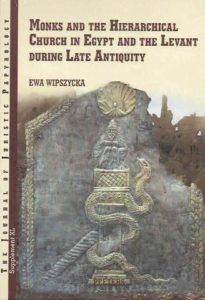
Ewa Wipszycka, Monks and the Hierarchical Church in Egypt and the Levant during Late Antiquity. 2021
Many modern scholars of late antique Christianity are convinced that there was a structural conflict between the Church of the bishops and monasticism, which was a charismatic movement that emerged alongside the Church hierarchy understood as a (reasonably) stable institution ruled by largely non-charismatic laws.
The author has decided to verify the validity of this opinion. She has studied groups of sources which focus on particular events and people in order to trace the social and political context of the conflicts, and to determine to what extent they were rooted in doctrinal controversies rather than the charisma, or the lack thereof, of the protagonists of ecclesiastical history. The book is therefore a collection of case studies in relations between the Church and monasticism in the vast area from Egypt to the Sasanian Empire. The studies show the full extent of the diversity of the relations between monastic groups and clergy.
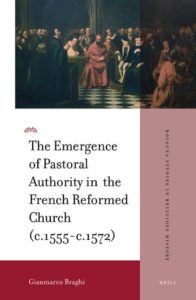
Gianmarco Braghi, The Emergence of Pastoral Authority in the French Reformed Church (c.1555-c.1572). 2021
In The Emergence of Pastoral Authority in the French Reformed Church, c.1555-c.1572, Gianmarco Braghi offers a broad overview of the issues and ambiguities connected to the implementation of the authority of the first generation of Geneva-trained French Reformed pastors and of their implications for the character and identity of the early French Reformed movement at large, using them as a prism for historical analysis of the transition from loose evangelicalism to a nascent synodal-consistorial network of Reformed congregations scattered across the kingdom of France.
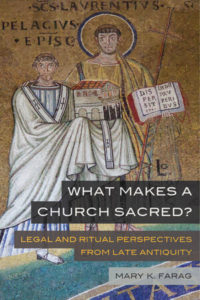
Mary K. Farag, What Makes a Church Sacred? Legal and Ritual Perspectives from Late Antiquity. 2021
University of California Press
What is the purpose of a church? Who owns a church? Mary K. Farag persuasively demonstrates that three groups in late antiquity were concerned with these questions: Christian leaders, wealthy laypersons, and lawmakers. Conflicting answers usually coexisted, but from time to time they clashed and caused significant tension. In these disputes, juridical regulations and opinions mattered more than has been traditionally recognized. Considering familiar Christian controversies in novel ways, Farag’s investigation shows that scholarship has misunderstood well-known religious figures by ignoring the legal issues they faced. This seminal text nuances vital aspects of scholarly conversations on sacred space, gift giving, wealth, and poverty in the late antique Mediterranean world, making use not only of Latin and Greek sources but also Coptic and Arabic evidence.
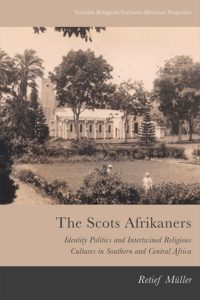
Retief Müller, The Scots Afrikaners: Identity Politics and Intertwined Religious Cultures in Southern and Central Africa. 2021
Drawing primarily on Dutch and Afrikaans archival sources including the Dutch Reformed Church Archive and private collections this book presents a trans-generational narrative of the influence and role played by diasporic Scots and their descendants in the religious and political lives of Dutch/ Afrikaner people in British colonial southern Africa. It demonstrates how this Scottish religious culture helped to develop a complicated counter-narrative to what would become the mainstream discourse of Afrikaner Christian nationalism in the early 20th century. The reader will encounter new perspectives on the ways in which the historical changeover from British Imperial rule to apartheid South Africa was both contradicted, but also in often paradoxical ways facilitated, by the influence and legacies of Scottish religious emissaries.
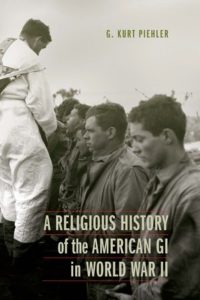
G. Kurt Piehler, A Religious History of the American GI in World War II. 2021
A Religious History of the American GI in World War II breaks new ground by recounting the armed forces’ unprecedented efforts to meet the spiritual needs of the fifteen million men and women who served in World War II. For President Franklin D. Roosevelt and many GIs, religion remained a core American value that fortified their resolve in the fight against Axis tyranny. While combatants turned to fellow comrades for support, even more were sustained by prayer. GIs flocked to services, and when they mourned comrades lost in battle, chaplains offered solace and underscored the righteousness of their cause. This study is essential reading for anyone seeking to understand the social history of the American GI during World War II.
Drawing on an extensive range of letters, diaries, oral histories, and memoirs, G. Kurt Piehler challenges the conventional wisdom that portrays the American GI as a nonideological warrior. American GIs echoed the views of FDR, who saw a Nazi victory as a threat to religious freedom and recognized the antisemitic character of the regime. Official policies promoted a civil religion that stressed equality between Protestantism, Roman Catholicism, and Judaism. Many chaplains embraced this tri-faith vision and strived to meet the spiritual needs of all servicepeople regardless of their own denomination. While examples of bigotry, sectarianism, and intolerance remained, the armed forces fostered the free exercise of religion that promoted a respect for the plurality of American religious life among GIs.
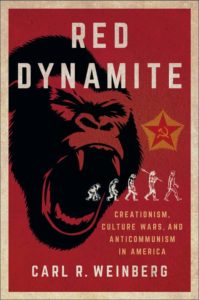
Carl R. Weinberg, Red Dynamite: Creationism, Culture Wars, and Anticommunism in America. 2021
In Red Dynamite, Carl R. Weinberg argues that creationism's tenacious hold on American public life depended on culture-war politics inextricably embedded in religion. Many Christian conservatives were convinced that evolutionary thought promoted immoral and even bestial social, sexual, and political behavior. The "fruits" of subscribing to Darwinism were, in their minds, a dangerous rearrangement of God-given standards and the unsettling of traditional hierarchies of power. Despite claiming to focus exclusively on science and religion, creationists were practicing politics. Their anticommunist campaign, often infused with conspiracy theory, gained power from the fact that the Marxist founders, the early Bolshevik leaders, and their American allies were staunch evolutionists.
Using the Scopes "Monkey" Trial as a starting point, Red Dynamite traces the politically explosive union of Darwinism and communism over the next century. Across those years, social evolution was the primary target of creationists, and their "ideas have consequences" strategy instilled fear that shaped the contours of America's culture wars. By taking the anticommunist arguments of creationists seriously, Weinberg reveals a neglected dimension of antievolutionism and illuminates a source of the creationist movement's continuing strength.
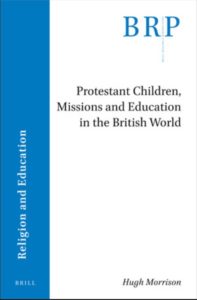
Hugh Morrison, Protestant Children, Missions and Education in the British World. 2021
At Christmas 1936, Presbyterian children in New Zealand raised over £400 for an x-ray machine in a south Chinese missionary hospital. From the early 1800s, thousands of children in the British world had engaged in similar activities, raising significant amounts of money to support missionary projects world-wide. But was money the most important thing? Hugh Morrison argues that children’s education was a more important motive and outcome. This is the first book-length attempt to bring together evidence from across a range of British contexts. In particular it focuses on children’s literature, the impact of imperialism and nationalism, and the role of emotions.
Finally, for staying up-to-date on the latest titles in all fields, we recommend regularly perusing New Books Network and its "New Books in Christian Studies” page. These pages are updated regularly.
